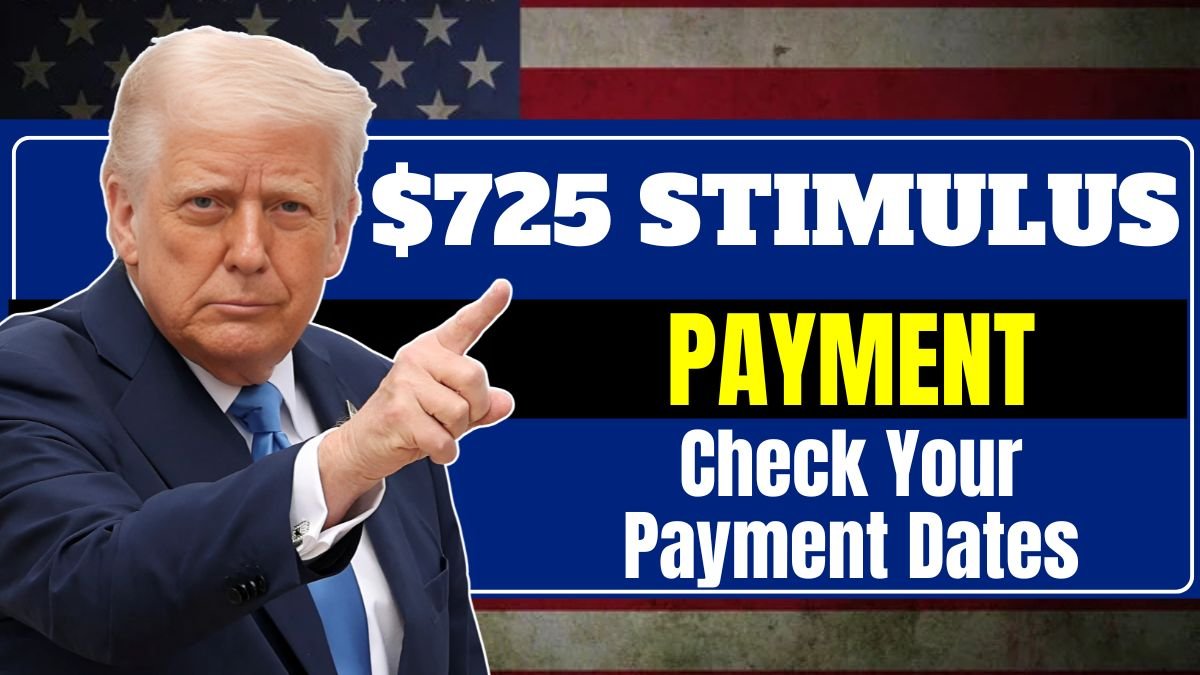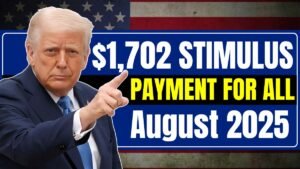Keeping in view the economy of America and the needs of the citizens, the government has been announcing relief packages (Stimulus Payments) from time to time. This time another good news has come out – a stimulus payment of $725 has been approved in August 2025, and its payment dates have also been made public.
Let us know in detail in this article who will get this new payment, when will it be available, how will it be available and what things are important to keep in mind.
Why is this stimulus payment being given?
Rising inflation rate, cost of housing, increasing expenditure on gas and grocery and difficulties of life – all these reasons have affected the economic condition of millions of citizens of America.
Keeping these circumstances in mind, the Biden government has decided to give a direct payment of $725 under a special economic assistance plan. Its objective is to provide relief to the citizens of low and middle income groups.
Who will get this payment of $725?
Not everyone will get this payment. Some fixed criteria have been set for this:
- Income limit: If a person’s annual income is $75,000 or less, they may be eligible.
- Married Filing Jointly: The limit is $150,000 for them.
- Head of Household: Those with income up to $112,500 are eligible.
- Citizenship: Only US citizens and green card holders in certain circumstances will be given this relief.
It is mandatory to have filed the 2024 tax return.
When will the payment start?
According to the schedule shared by government sources and the IRS, this payment will start from the second week of August. However, not everyone will get the money on the same day. The payment will be made in stages based on the bench:
| Group | Payment Date |
|---|---|
| SSI/SSDI Beneficiaries | August 8, 2025 |
| Senior Citizens (60+) | August 12, 2025 |
| Low-Income Workers | August 16, 2025 |
| Tax Return Filers | August 20, 2025 |
| Paper Checks | August 25, 2025 |
How will you receive the payment?
Most people will receive the amount in their bank account via Direct Deposit. Those who do not have bank details on record with the IRS will receive the payment via paper check or prepaid debit card.
Important: Keep your information updated by visiting the IRS portal so that you do not face any delay in payment.
Will you have to pay tax on it?
No. This stimulus payment is completely tax-free. This means that you will not need to report it in your tax return and you will not have to pay any additional tax on it.
What should people who did not receive the previous stimulus do?
If you did not receive a payment in any of the previous stimulus rounds, do not panic. You can still get that amount by claiming the “Recovery Rebate Credit”.
By logging on to the official website of the IRS (irs.gov), you can check your status and update it if needed.
What kind of relief will this stimulus bring?
For many families, this amount of $725 will:
- Help pay rent
- Help prepare children for school
- Help pay credit card bills
- Ease the burden of gas, grocery and utility bills
In short, this amount will be a temporary sigh of relief for many households.
Who can get delayed payments?
In some cases, payments may be delayed:
- Those whose tax returns have not been processed yet
- Those whose bank details are incorrect or incomplete
- Those whose address has changed and paper checks are being sent
- Technical errors or system updates may also cause occasional delays
Beware of fake calls and emails
Whenever the government announces such relief schemes, scammers also become active. Remember:
- The IRS never calls and asks for your personal information
- Do not give your information by clicking on a link
If contacted by a suspicious call or email, report it to reportphishing@irs.gov
Is this the last stimulus?
Currently, the government has approved this payment for August 2025. If the economic situation or inflation rate worsens in the future, it is possible that the government may bring a new relief package again. But no other payment has been confirmed at the moment.
Conclusion:
This new stimulus payment of $725 is set to arrive in August 2025 and could be a big relief for millions of Americans. This amount will be helpful for those who have limited income, rely on Social Security benefits or are trying to recover from the effects of the pandemic.
FAQs
Q1. What is the $725 stimulus payment?
A: It is a one-time economic relief payment approved by the U.S. government to support eligible citizens during rising inflation and financial hardships in August 2025.
Q2. Do I need to apply for the $725 stimulus?
A: No separate application is required. If you meet the eligibility criteria and have filed your 2024 tax return, the IRS will process your payment automatically.
Q3. Will this payment be taxed?
A: No, the $725 stimulus payment is tax-free and does not need to be reported as taxable income.
Q4. What if I didn’t receive the previous stimulus payments?
A: You may still be able to claim the Recovery Rebate Credit when filing your federal tax return. Check your IRS account for eligibility.
Q5. What should I do if my bank account or address has changed?
A: Update your bank or mailing information immediately on the official IRS portal at irs.gov to avoid delays.


